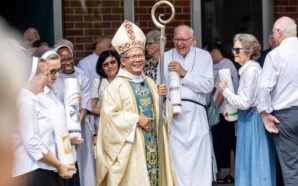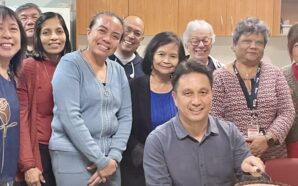As a member of the Plenary Council communications team, The Southern Cross‘s Jenny Brinkworth was privileged to witness first-hand the proceedings of the final assembly in Sydney last month.
Our task was to capture the historic gathering through video, photography, the written word, podcasts and social media posts as well as hold daily journalist briefings and respond to media requests.
I spent much of the time in the hall at St Mary’s Cathedral College where the 277 members gathered for prayer, spiritual conversations, interventions and voting on more than 35 motions arising from four years of consultation and discernment. We also had a live feed playing on the TV in our makeshift communications ‘headquarters’ to ensure we didn’t miss a beat.
Ably led by former New Zealand journalist Gavin Abraham (now Bishops Conference media and communications director), the team’s aim was to provide as much information as possible, in a timely manner, without compromising the integrity of the process.
Contrary to what some people might think, there was no spin or censorship (we didn’t have time for that). Even when the program looked like it might be derailed, there was no attempt to minimise the importance of what took place, and the results of both consultative and deliberative voting on the role of women in the Church were made public as scheduled.
Not surprisingly, some secular and Catholic news sources were quick to pick up on the disunity angle. Feeding off the polarised views within the universal Church, their previously lukewarm interest intensified and transformed into headlines such as The church with no faith in its women or, at the other end of the spectrum, Catholics under fire in battle against ‘woke’ church.
It is true there was palpable tension in the hall after the announcement of the deliberative vote of the bishops, but this had been building from the previous day when some female members expressed concern that the motions devalued the contribution of women at the grassroots level. There was pushback on proposals to strengthen the role of women in governance and on the issue of ordination of female deacons. A little reported fact was that the shorter of the two motions on the topic ‘Witnessing to the equal dignity of women and men’ was not passed by a two thirds majority of the consultative vote, which involved all members.
When it was announced that the two deliberative votes (bishops only) had failed to reach the required majority, emotions ran high and after morning tea about 60 members spontaneously decided not to return to their tables and instead stood at the back of the hall. At the same time, some of the bishops were querying amongst themselves the voting outcome and the relatively high proportion of ‘placet juxta modum’ or ‘yes with reservations’ votes which equated to a ‘no’.
Some members spoke of a gust of wind blowing into the hall that day and believed it was the Holy Spirit moving from comforter to disruptor.
But the Spirit needs something to work with and on this occasion there were two avenues: the practice of deep listening entrenched in the entire Plenary Council process; and the quick-thinking of the astute Bishop Shane Mackinlay, vice president of the Council, as he realised the program could not continue as planned.
While ‘deeper discussion’ took place at tables, behind the scenes there was a reshuffling of rooms and lunch venues to enable the bishops and steering committee to meet to discuss the options, including the use of ‘placet juxta modum’.
At the same time, those members distressed by the outcome of the voting gathered in the library to hear from periti (advisers) and share concerns that they took back to the assembly in the afternoon.
By Thursday the program was back on track, after some reshuffling and changes to the format of dealing with motions.
Members worked their way through the remaining proposals with a greater sense of ownership of the final wording and without controversy, or media fanfare. The redrafted motions on the role of women, which were clearer but not substantially changed, were passed by an overwhelming majority. Out of the messiness came unity.
When the Council ended, there were more tears and emotion but they were non-newsworthy tears of relief, joy and exhaustion.
As Archbishop Costelloe said at the final media briefing, the “real Plenary Council happened inside the room” and the members would be its best ambassadors by going back to their communities and telling the “real story”.
Jenny Brinkworth is the Editor of The Southern Cross and the Director of Catholic Communications in the Catholic Archdiocese of Adelaide.
Reproduced with permission from The Southern Cross, the news publication of the Catholic Archdiocese of Adelaide.







